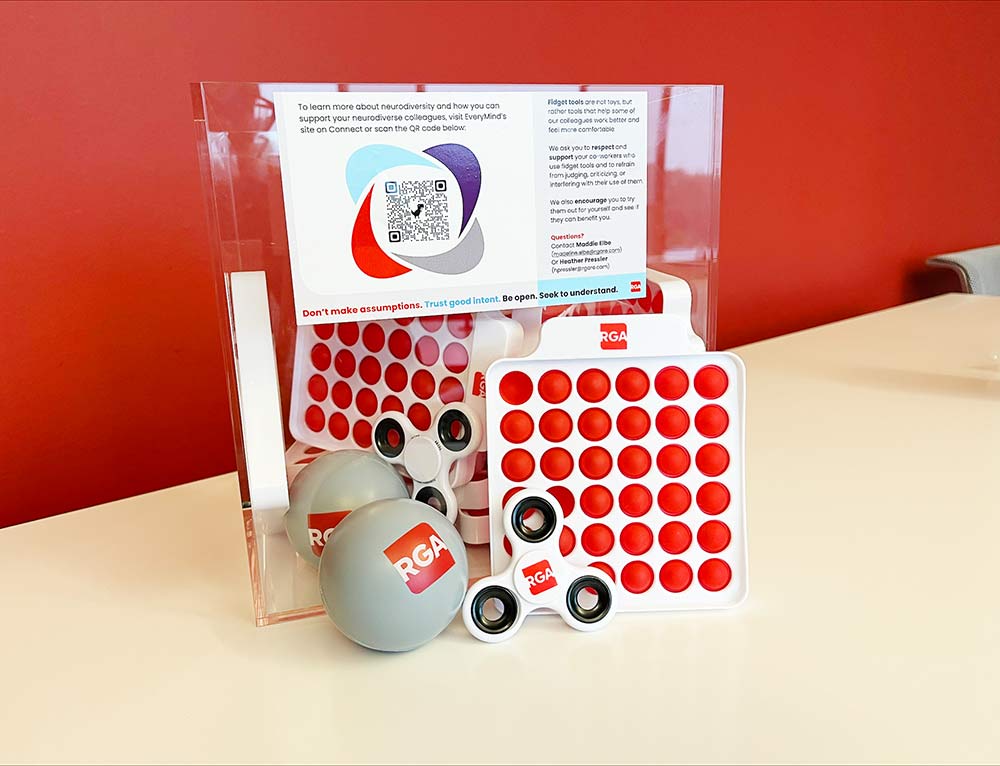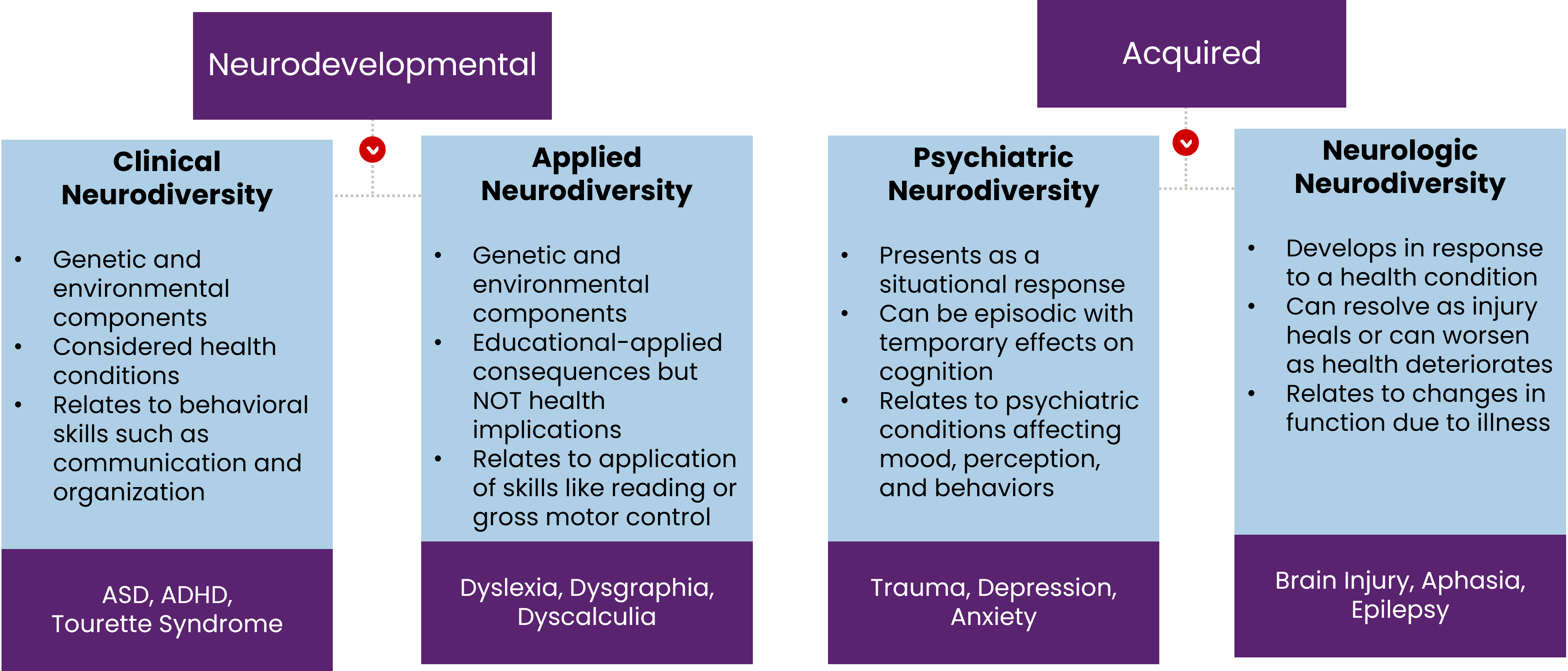The unique skills of neurodivergent workers
Neurodivergent people often offer extraordinary or competent strengths in some areas, combined with significant challenges in others. Neurotypical people tend to have a more equal range of competencies.
Thinking differently does not make me less able, less intelligent, or less employable. Rather, it gives me a competitive advantage. Having ADHD provides me with a unique perspective because I see and process the world differently than most.
Differences in how individuals process information or communicate ideas are not symptoms that need fixing but are strengths that need embracing.
– Maddie Elbe, Business Analyst, RGA Global Financial Solutions Co-Lead, EveryMind@RGA Employee Resource Group
Some scientists have connected the unique strengths of neurodivergent people to evolutionary advantages[3]. For example, the three-dimensional thinking common in people with dyslexia could have been useful in ancient cultures for making tools, planning hunting paths, and building shelters. Similarly, traits related to attention deficit hyperactivity disorder (ADHD), such as being active, easily distracted, and impulsive, could have been helpful in societies where survival depended on continually moving to find food, quickly reacting to changes in the environment, and skillfully approaching or avoiding prey.
When viewed through this lens, neurodivergent conditions shift from a challenge to a significant opportunity.
Neurodivergent employees can be:
- Detail oriented
- Retentive
- Punctual
- Reliable
- Academically smart
- Logical
Many of these skills overlap with the specific needs of insurers and other financial services companies. According to the 2020 World Economic Forum report, the top three sought-after skills in the financial services sector are:
- Analytical thinking and innovation
- Critical thinking and analysis
- Creativity, originality, and value
Researchers for the U.K. Institute and Faculty of Actuaries (IFoA), pointed to this overlap while suggesting[4] neurodivergent professionals could possess much-needed “superpowers” for the insurance industry.
Challenges facing neurodivergent professionals
Like other groups with non-majority identities, neurodivergent individuals may experience challenges in interacting with others individually or in groups. They may face unequal distribution of social power, limited social-cultural representation (or stereotyped and biased representation), and difficulty navigating environments tailored towards neurotypicals (differences in their education, work environments, or conventional social practices).
For example, neurodivergent individuals may have less comfort with neurotypical social expectations for a workplace, such as engaging in “water cooler” talk, which, arguably, may often not be a positive or productive use of employee time.
Challenges can even begin in the job application process, which is usually structured in a way that does not accommodate neurodivergent people. For example, during in-person job interviews, autistic individuals may not make eye contact and may have touch sensitivities, which place them at a disadvantage with an interviewer who expects eye contact or a handshake. Similarly, neurodivergent candidates with social awkwardness may be unfairly compared to socially confident candidates, as if confidence equates to competence.
Strategies to engage neurodivergence in the workplace
How can workplaces better accommodate neurodivergent individuals? Inclusion starts with awareness and acceptance.
Give neurodivergent individuals (NDIs) a voice
Providing a seat at the table for the NDI ensures that person’s experiences inform any workplace policies and communications around neurodiversity. Encouraging neurodivergent employees to form an employee resource group (ERG) is a great place to start.
RGA’s ERG for neurodivergent individuals and allies, EveryMind@RGA, was founded to represent the interests of the neurodivergent community, raise awareness about the unique needs and talents of neurodivergent individuals, bolster career development, and support caregivers of neurodivergent individuals. EveryMind@RGA members provide resources and tools to the RGA community, host webinars about neurodivergence, and advocates for inclusive workplace policies.
Acknowledge current barriers and adjust
With input from NDIs or a neurodiversity ERG, companies can identify possible barriers throughout their organization, from the hiring process and employee evaluation criteria to formal and informal policies for communication, meetings, and work assignments.
Many workplace challenges can be remedied through simple accommodations like the examples below:
The “curb-cut effect”: Named for the national effort to “cut” into street curbs with ramps to accommodate wheelchair-users – which ultimately also benefitted bicyclists, runners, walkers and stroller-pushers – the cut-curb effect describes how addressing the disadvantages or exclusions faced by one group of people fosters an environment that allows everyone to fully participate.

Celebrating Difference: To recognize Neurodiversity Celebration Week, RGA’s neurodiversity employee resource group introduced fidget tools to meeting spaces in our U.S. headquarters. The spinners, squeeze balls, and pop-boxes are not toys but tools that any employee can manipulate to reduce stress, anxiety, and boredom, and improve focus, memory, and creativity.
Allow everyone to be their authentic selves
How to Respond: When working alongside neurodivergent individuals, be aware of potential biases. Do not assume past experiences with people with disabilities will apply directly to another individual. Because each person is unique in their experiences and perspectives, the best way to engage with NDIs is to ask about their individual preferences and needs.
I tell anybody and everybody that I’m autistic. Disclosure for me is all about breaking the stigma and creating a safe space where everyone can be authentic. I’m proud to be on the spectrum.”
– Heather Pressler, Associate Marketing Underwriter, RGA U.S. Group Re Healthcare Turnkey Co-Lead, EveryMind@RGA Employee Resource Group
Pay attention to mental health and wellness/wellbeing
Neurodivergent individuals do not automatically need mental health resources simply because they have a diagnosis. However, just as it can be for neurotypical individuals facing challenges, therapy can be beneficial in enhancing daily functioning at work and in community settings. Neurodiversity-affirming therapy emphasizes acceptance, respect, empathy, empowerment, and advocacy.
From a mental health perspective, being "different" as a child or adolescent can trigger bullying by peers, including exclusion. Bullying results in anxiety, depression, perfectionism (including Obsessive-Compulsive Disorder or OCD), and Post-Traumatic Stress Disorder or PTSD. Some neurodivergent individuals adopt “masking” skills in response to this type of trauma.
The 3 layers of masking:
- Compensation – Deliberate effort to learn social skills that are not intuitive.
- Masking – Active suppression of typical behavior to fit in.
- Assimilation – Presenting as someone you are not to avoid exclusion.
NDIs can struggle with the mental health toll of “masking” in neurotypical environments. Masking is associated with anxiety, depression, perfectionism, and poor self-image, and can lead to burnout. Fostering neurodiversity in the workplace creates an environment where NDIs can experiment with unmasking, share their diagnosis with colleagues, and move closer to bringing their authentic selves to work.
Conclusion
Fostering neurodiversity in the workplace is not just an inclusion imperative but also a strategic advantage for organizations. Neurodivergent professionals possess unique skills and perspectives that, when leveraged correctly, can offer substantial benefits to such industries as insurance and financial services. The challenges posed by ableist structures and societal norms can undoubtedly pose barriers. However, through such efforts as enhanced understanding and awareness, proactive accommodations, and genuine engagement strategies, these obstacles can be mitigated and neurodivergent employees can participate fully in the workplace.








